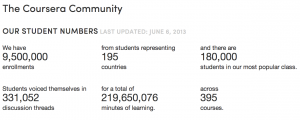MOOCs: nothing more than the latest craze… or are they?
“Big breakthroughs happen when what is suddenly possible meets what is desperately necessary.”
– Thomas L. Friedman (May 15, 2012)
2012 was a year of many events and breakthroughs. The global economic crisis continued to be pervasive, the release of quad-core smartphones and tablets marked a new generation of digital devices, Queen Elizabeth II opened the Olympics with a skydiving stunt, and Microsoft pulled off their own stunt with the release of Windows 8.
It was also in 2012 that many high-profile universities clamoured to become affiliated with MOOC platforms such as Coursera and become part of that area where digital media and devices meet education. In fact the New York Times fondly named 2012 “The Year of the MOOC”.
What are MOOCs and are they just a passing fad?
A MOOC, or massive online open course, sees education finally latch on to contemporary digital opportunities in a significant way. While online education is certainly not breaking news, MOOC platforms have succeeded in bringing together some of the most renowned universities and the global community within the virtual space. For instance, Coursera was started by Stanford professors Andrew Ng and Daphne Koller, and edX is a MOOC platform co-founded by the Massachusetts Institute of Technology and Harvard University.
MOOCs have been around for some time now. However, over the past one to two years there has been an unprecedented rise in the development of MOOCs, MOOC platforms and, most importantly, actual participation. In March 2013 alone 90,000 participants from 143 countries signed up for the University of Virginia’s “Foundations of Business Strategy” offered through Coursera (Nurmohamed et al, 4 July 2013), and as of June 2013 Coursera could boast the following statistics:

Screenshot taken on September 7, 2013 from www.coursera.org/#about/community (click to enlarge image)
With such a critical mass of participants and courses being developed in a quasi-exponential way, this could lead to the assumption that the traditional university education system and adult education programs are somewhat lacking. Therefore, have digital platforms of education become a solution to gaps in more traditional systems of education? While a complete answer to such a question could currently be premature, taking a look at the driving forces behind the development of MOOC platforms is beneficial.
While the idealistic motivations behind the development of MOOC initiatives are debatable, Daphne Koller explains the ideal of MOOCs quite well in her TED Talk “What we’re learning from online education” (June 2012):
MOOC platforms are revolutionary in their interactive approach to learning by capitalizing on the formation of a virtual learning (and global) community. Just as Koller mentions, people have the possibility to interact with each other, with the course material, with the professor, and with the digital platform itself in ways that are still very much absent from traditional forms of adult education.
Yet, with many academics branching off to found start-ups in this area and universities clamouring to take part, could the driving force behind this MOOC hype be more a case of a rush to capitalize from this new economic opportunity within education? Has the development and provision of MOOCs been so successful in such a short period of time because of an ideal or because of a money-making opportunity? Or, perhaps, do both motivations need to co-exist?
The crux of the matter
Whether or not MOOCs are here to stay is speculative but their current global success signifies popular demand for digital or remote access to the education. Individuals and institutions now have increased access to university-level courses, provided they have access to a device that can connect to the web.
Ultimately, even if MOOCs are simply the latest fad, they have unearthed issues and questions that cannot be ignored, including:
- Accessibility to education: as Koller states in her TED Talk, “It will allow people who lack access to world-class learning — because of financial, geographic or time constraints — to have an opportunity to make a better life for themselves and their families.”
- Opportunities for academic research: never before has there been such a data-driven opportunity to analyze real-time learning as opposed to hypothesizing or theorizing in hindsight (Koller 2012)
- Is this one of many potential digital solutions to problems in global education?
- In the long-term will traditional methods of learning be accepting of digital solutions to areas lacking?
- And, as Guthrie (2012) puts it, is this simply the “massification of education”?
References
Friedman, Thomas L. (2012, May 15) “Come the Revolution.” The New York Times Retrieved on September 4, 2013 from http://www.nytimes.com/2012/05/16/opinion/friedman-come-the-revolution.html?_r=0
Guthrie, D. (2012). Jump off the Coursera bandwagon. Chronicle of Higher Education, 59(17), p. 18.
Koller, D. (2012, June). Daphne Koller: What we’re learning from online education [Video file]. Retrieved from http://www.youtube.com/watch?v=U6FvJ6jMGHU
Nurmohamed et al. (2013, July 4). A New Use for MOOCs: Real-World Problem Solving. Retrieved on September 4, 2013 from http://blogs.hbr.org/cs/2013/07/a_new_use_for_moocs_real-world.html
Pappano, L. (2012, November 4). The Year of the MOOC. The New York Times. Retrieved on September 4 from www.lexisnexis.com/nl/business